String
Theory
Solina V models the hugely popular ensemble keyboard made by Eminent and later rebadged by ARP.
Chillwave, vaporwave, nu-disco, old disco, ambient, classic funk, and even trance just wouldn’t be the same without the gluey, cosseting vibe of analog string machines. Gary Wright, Jean Michel Jarre, Vangelis, Styx, The Buggles, and Parliament-Funkadelic all immortalized their sound.
The Original
We began by carefully studying the Solina Mk 1, then we created a detailed computer model. It doesn’t get any more realistic than this.
Time Capsule
The Solina is heard on more ’70s tracks than any other electronic keyboard, making it a must-have that no sample can duplicate.
Fits Your Mix
Put all the Solina’s retro deliciousness in your tracks without the hassle of finding, maintaining, and recording vintage analog gear.
More Than Strings
Get the signature sound — then discover just how far beyond that you can go thanks to the advanced synth features we added.
Before polyphonic synths,
there were string machines
Needed a backing orchestra for your band? Far-out sounds to stack atop your electric piano? The Solina was your ticket.
Onstage, it opened up a new world of sound to keyboardists eager for options beyond piano, organ, and monosynth. In the studio, it brought real orchestration power to artists who weren’t in the “just hire orchestra players” league. It became a staple of prog, funk, and disco. Its sound is as ear-catching today as ever.
The history of string machines goes back to the 1960s, when keyboardist Ken Freeman experimented with a Selmer Clavioline and multiple delays, hitting on a combo that made a solitary voice sound like a section. His Freeman String Symphonizer (a.ka. Cordovox CSS) sounded incredible but was neither first to market nor most popular. That honor would go to the Solina.
Discover the history of Solina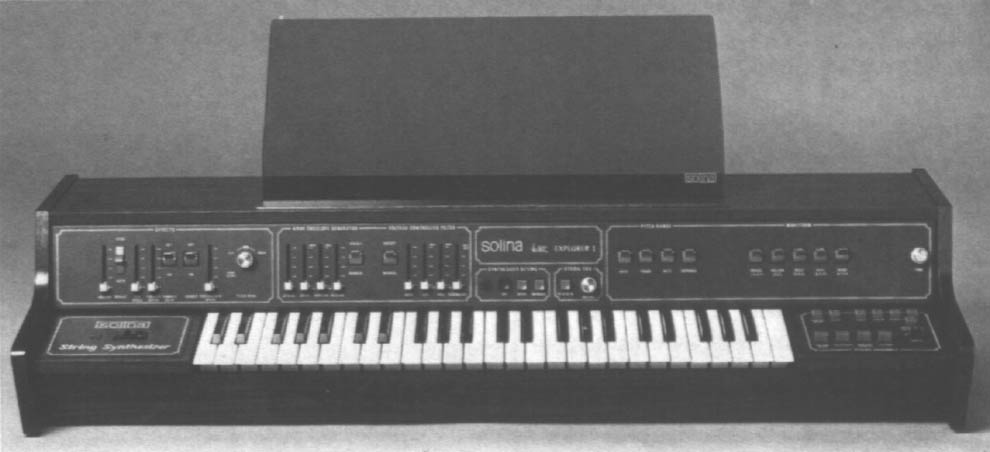
Fresh
Out of the Box
Like a never-used Solina, only better.
We’ve preserved the controls layout and paid homage to the look — and added just the right extras to elevate the Solina experience.
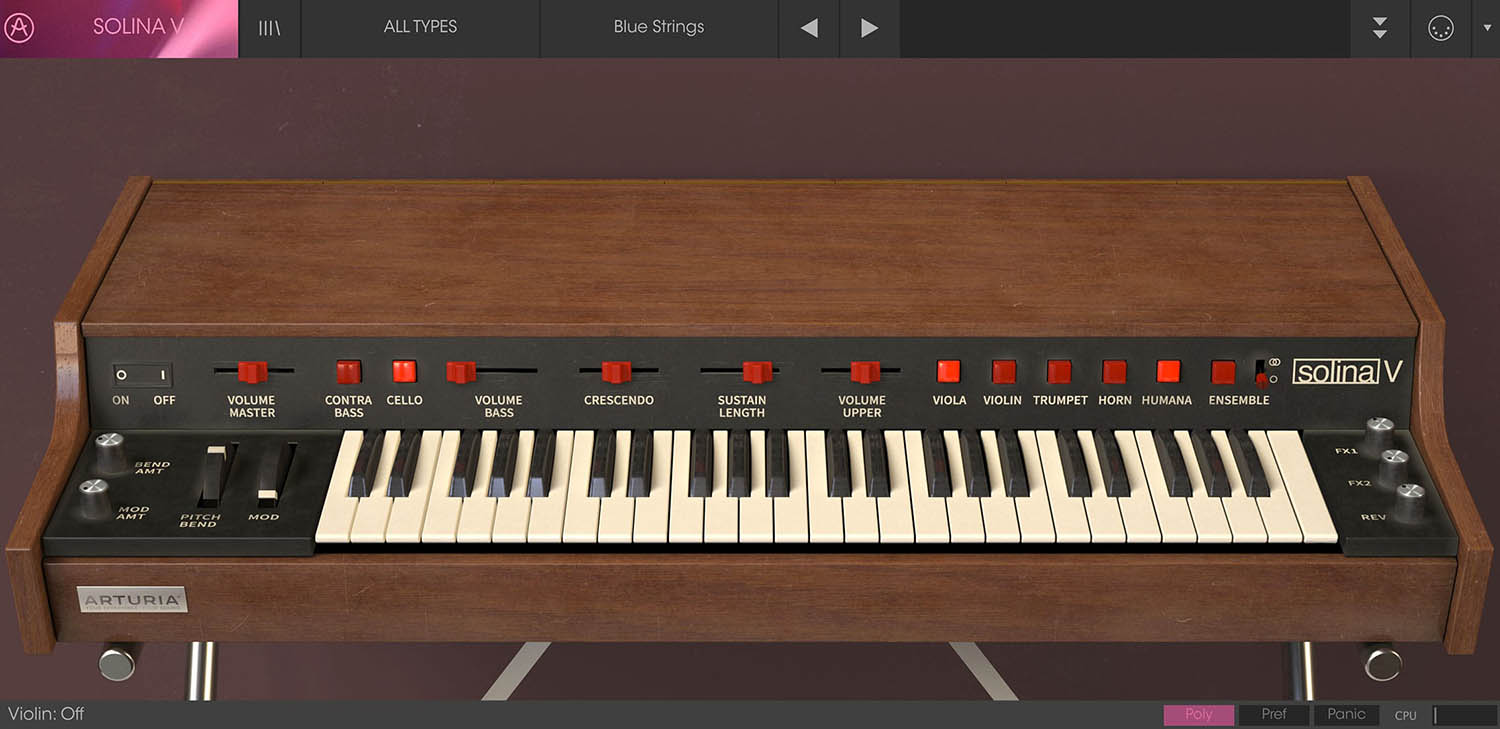
_1
_2
_3
_4
_5
01. Disco Infiltrator
Boogie down with the original Solina voices plus the classic Ensemble effect. Hit the stereo option for an even lusher sound.
02. Human Nature
Solina V borrows a sound from another famous polyphonic keyboard: the “Vox Humana” patch heard on “Cars“ by Gary Numan.
03. Bass Is the Place
Split the keyboard and play bass in the left hand, either layered with the main sound or by itself.
04. Pitch and Mod
Solina V adds pitch and modulation wheels with adjustable depth amounts for more synth-like control over your sound.
05. Retro FX
Dial in period-perfect phaser, chorus, and delays, as well as a convolution reverb to put Solina V in a recording-ready space.
The Solina
Everyone Always Wanted
Heart of a string machine, brains of a synth
If Solina players longed for one thing, it was for their instrument to be more like a synth. Open up the Advanced Panel, and that’s exactly what Solina V is. These features enhance your playing when you want them and get out of your way when you don’t.

This 3-band filter bank comes from the same “Poly” keyboard as the Vox Humana sound, providing surgical creative control over the frequency spectrum.
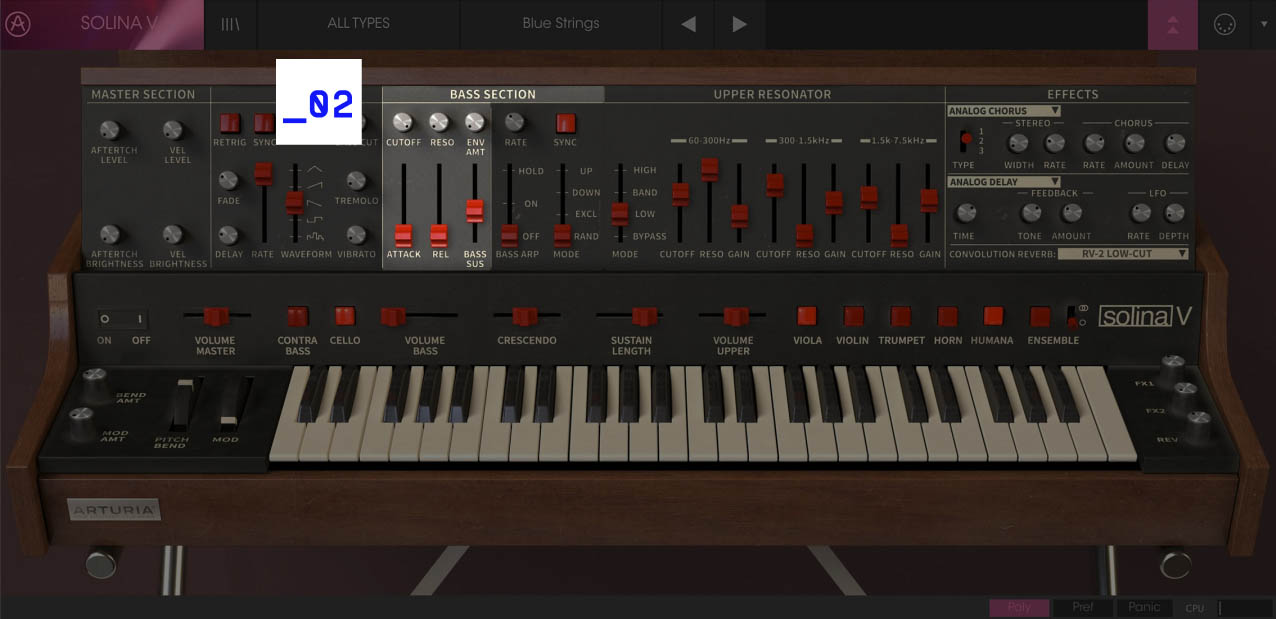
Make the Bass Section bow-wow like a synthesizer with the resonant low-pass filter, and dial up a little sustain for string bass sounds.
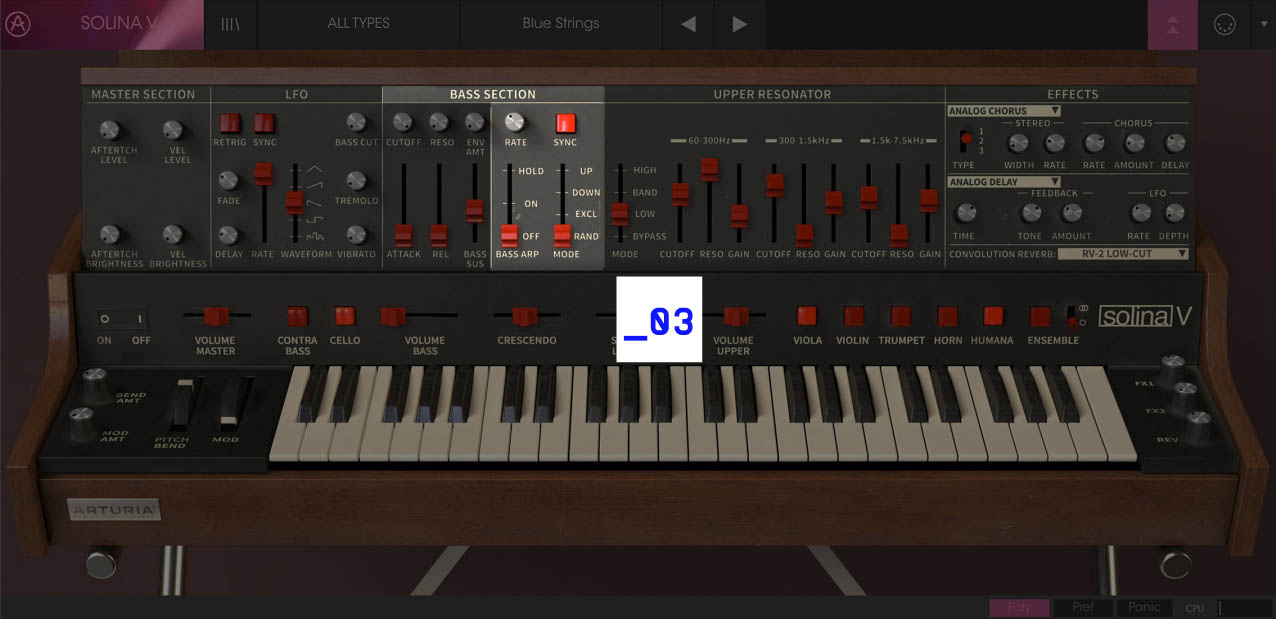
A one-octave Arpeggiator just for the Bass Section is perfect for “walking bass” and other animation, and syncs to your master project tempo.
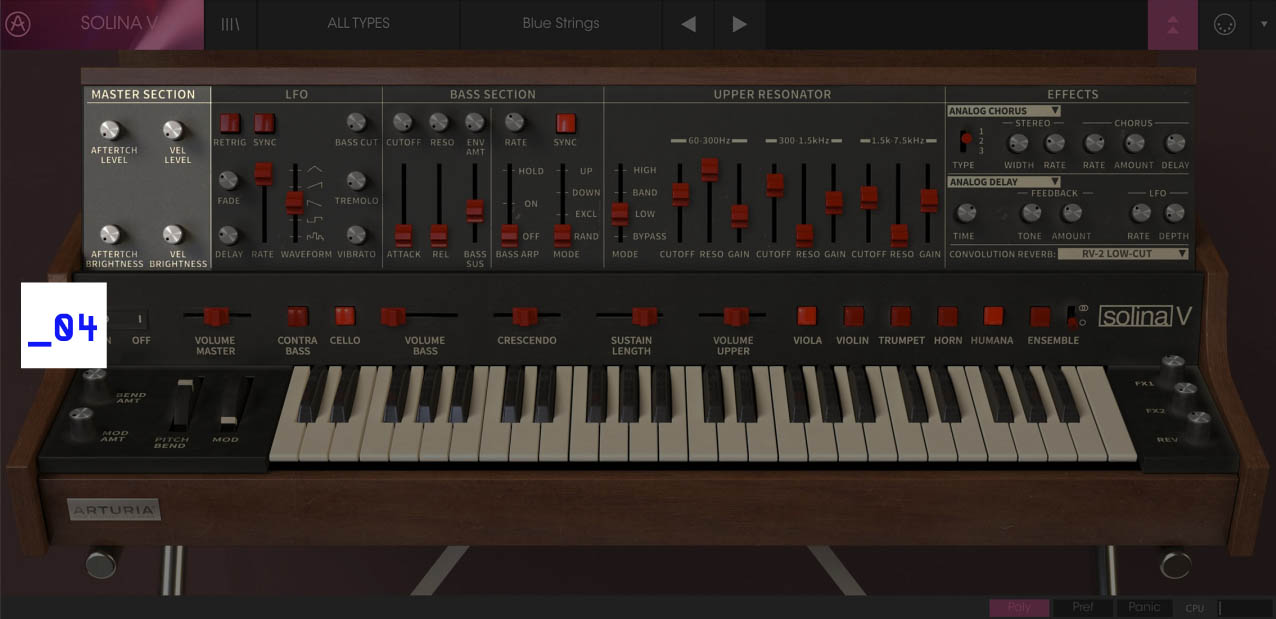
Optimize your keyboard response with velocity and aftertouch control of both volume and brightness.
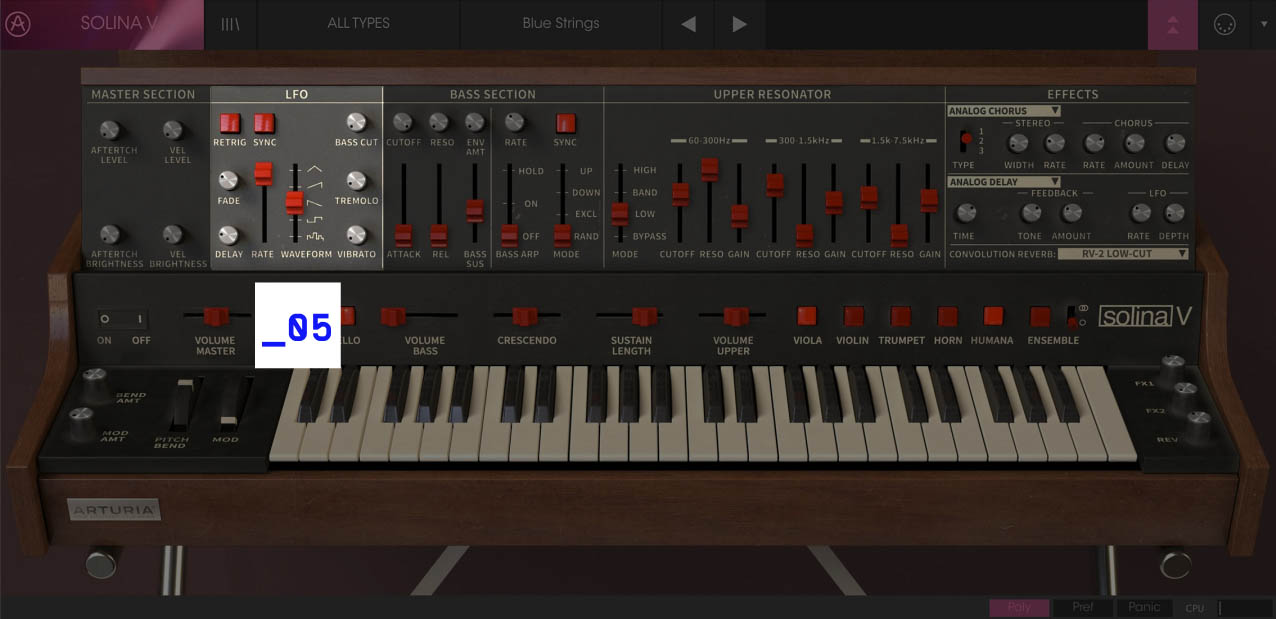
The tempo-syncable LFO offers a myriad of options for modulation brought in by the wheel.
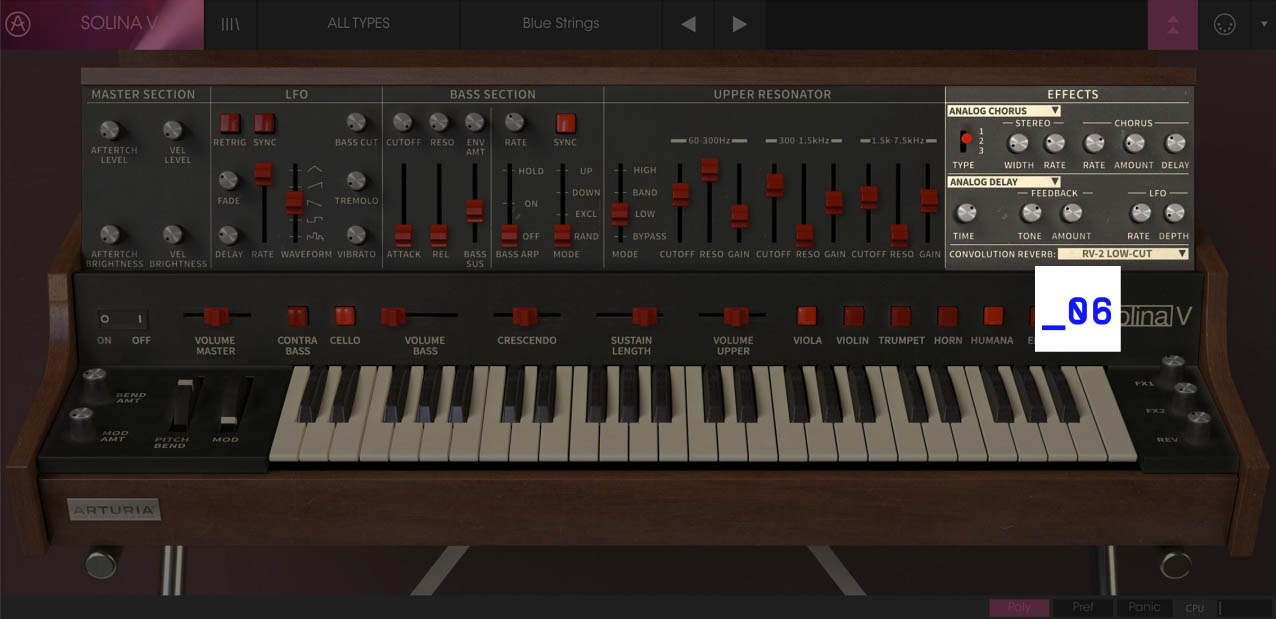
Our FX are curated to complement the Solina sound perfectly. The Convolution Reverb emulates vintage plates and springs.
In Aktion
anhören
You know all about swirling pads and roller-disco string parts, but Solina V can have a far broader job description in your music.
These artists took its versatility for a test drive and came up with some tracks that prove our point.
Song for Jill
SDG
Pachelbel's Canon
All sounds are from Solina V.
Creepy Carrousel
All sounds except banjo and drums are from Solina V.
Demo
Chillax
All keyboard sounds are from Solina V. The backing track is the “Diamond Strings” preset. The lead is the "Fat in the Middle" preset by Erik Norlander.
Boardeau
Artistscorner
PressClippings

Enthalten in
V collection
Legendäre Keyboards wiederbelebt
Dieses Instrument ist auch Bestandteil der V Collection – deiner kompletten Wunschbesetzung von legendären Synthesizern, Orgeln, Pianos und Instrumenten, die Keyboard-Geschichte geschrieben haben. Diese wurden mit den fortschrittlichsten Technologien für authentischen Realismus emuliert und mit neuen kreativen Möglichkeiten ausgestattet. Egal, ob als DAW-Plug-In im Studio oder als Standalone-Version bei Auftritten, die V Collection gibt dir die besten Tasten-Instrumente aller Zeiten für eine sofortige Inspiration in deine Hände.
Erfahre mehr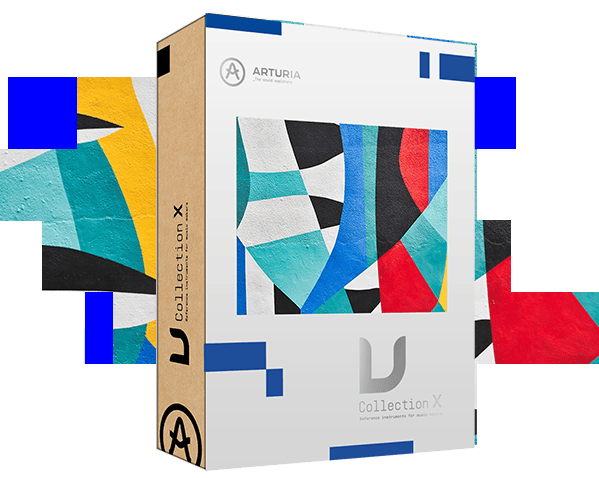
Die Features
Du brauchst

Integrierte In-App-Tutorials führen dich durch jeden Aspekt des Instruments, von individuellen Parametern bis hin zu Tipps unserer Sounddesigner, damit du dich auf deinen kreativen Moment konzentrieren kannst. Das kann doch nicht so einfach sein, ist es aber!

Mit dem Arturia Software Center kannst du deine Arturia Software an einem Ort herunterladen, organisieren und aktualisieren und alle deine Lizenzen für mehrere Geräte verwalten. Einfacher geht es nicht!

Unsere virtuellen Instrumente und Plug-Ins wurden so entwickelt, dass sie problemlos direkt in dein Setup passen. Unabhängig von deinem Style kannst du jeden Sound erkunden und gleichzeitig die volle Kompatibilität mit den wichtigsten DAWs sowohl unter Windows als auch unter macOS genießen.

Finde sofort den richtigen Sound mit dem intelligenten & optimierten Preset-Browser. Suche nach Schlüsselwörtern, nach Instrumentenart, Musikstil und nach vielem mehr - du kannst sogar deine Favoriten speichern, um diese später schnell aufzurufen.

Egal, ob du mit einer Vollbilddarstellung in unsere klassischen Instrumentenemulationen eintauchen oder kostbaren Bildschirmplatz sparen willst – die Bedienoberflächen für alle virtuellen Arturia-Instrumente können beliebig skaliert werden – ganz nach deinem Geschmack.

Unsere Instrumente sind für den nahtlosen Einsatz mit der Arturia KeyLab-Serie vorkonfiguriert - aber sie funktionieren natürlich auch mit anderen MIDI-Controllern. Und mit dabei: Makros für direkte Sound-Optimierung, einfache DAW-Integration und Standalone-Betrieb.
TAE®-Powered
Die exklusive Analog-Emulations-Technologie, die unsere Nachbildungen von den Originalen nicht mehr unterscheidbar macht.
Indem wir die Eigenschaften analoger Oszillatoren, Filter und Soft-Clippings exakt nachahmen, können wir sowohl erstaunliche komponentengenaue Details, als auch authentischen Analog-Charme bieten.
Erfahre mehr
Galerie
Main Features
All of the original parameters of the ARP/Eminent Solina string ensemble
Vox Humana sound modeled after the original 1978 Bob Moog's Polysynth
Classic Paraphonic operation as well as selectable Polyphonic mode
1978 Bob Moog’s polysynth resonator section on Upper Section
24dB per octave resonant filter on Bass Section
Arpeggiator on Bass Section
LFO for vibrato, tremolo and filter modulation
Aftertouch and velocity level controls
Solina MK1 and MK2 ensemble modes
3-mode stereo chorus
Stereo dual phaser
Analog delay
Digital sync delay
Convolution reverb with 24 modeled reverbs
150 presets
Betriebssystem-Spezifikationen
Windows
- Win 10+ (64bit)
- 4 GB RAM
- Vierkern-CPU, 3.4 GHz (4.0 GHz Turbo-boost)
- 3GB freier Festplattenspeicher
- OpenGL 2.0 kompatible GPU
- ARM Prozessoren werden unter Windows nicht unterstützt
Systemvoraussetzungen
- Arbeitet als Standalone, VST, AAX, Audio Unit, NKS (nur mit 64-Bit DAWs).





Apple
- Mac OS 11+
- 4 GB RAM
- Vierkern-CPU, 3.4 GHz (4.0 GHz Turbo-boost) oder M1 CPU
- 3GB freier Festplattenspeicher
- OpenGL 2.0 kompatible GPU
Arbeiten mit dem ASC
- Eine elegante und einfache Lösung, die dir bei der Installation, Aktivierung und Aktualisierung der Arturia-Softwareinstrumente hilft.
Alle auf dieser Seite genannten Hersteller- und Produktnamen sind Marken der jeweiligen Eigentümer und stehen in keiner Weise mit Arturia in Verbindung. Die Markenbezeichnungen anderer Hersteller dienen ausschließlich der Kennzeichnung der Produkte derjenigen Hersteller, deren Eigenschaften und Klang bei der Entwicklung analysiert wurden. Alle Namen von Geräten, Entwicklern und Herstellern werden nur zur Veranschaulichung und zu Bildungszwecken aufgeführt und stellen keine Verbindung oder Billigung durch einen Geräte-Entwickler oder -Hersteller dar.


